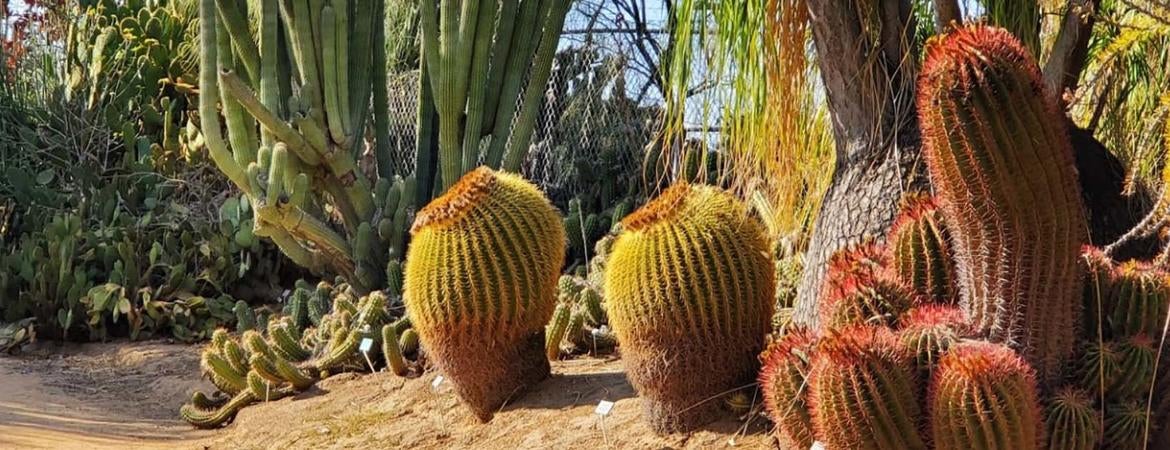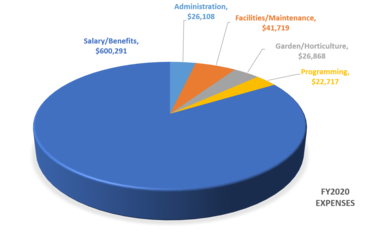
The UCR Botanic Gardens were thriving from July 2019 through mid-March 2020, when the Coronavirus pandemic caused the closure of UCR and other schools. On March 16 the Gardens were closed and all programs and activities were cancelled, with only essential staff allowed to work on-site. This article reviews our year and summarizes our budget, accomplishments, and goals for the year ahead.
Vision and Mission
The UCR Botanic Gardens is UCR’s living museum, public garden, and nature oasis in a busy urban environment. Our activities advance our mission of serving as a focal point for campus and community engagement in the science of nature, gardens, and conservation. We strive to create a sense of place where our visitors experience nature and are inspired to protect our natural world.
2019-2020 Accomplishments
Administration and Management
Our staff is small but dedicated; in addition to the part-time Director we have five full-time, one part-time, and eight student workers. In 2019 we recruited a new Manager, Miguel Estrada, who replaced Theresa McLemore who retired in 2018. Theresa was recalled for Special Projects through February 2021, after which she will begin her retirement in earnest. We receive administrative support from UCR including the BEES Administrative team and CNAS Assistant Dean for Development, Human Resources staff, and Director of Communications; all are listed inside the front cover of each Newsletter. We could not operate without the hard work of dozens of volunteers who give thousands of hours to the Gardens. Our Friends members, UCR’s oldest support group, provide revenue through annual dues. Since their founding in 1980 many Friends have also been active volunteers, and we gratefully acknowledge all those who contribute their time, talent, and financial support for the betterment of the UCR Botanic Gardens.
Budget overview
The UCRBG income is comprised of CNAS funds (salaries and benefits), earned revenue (plant sales, Primavera, conference room rentals, and events), gifts and endowment payouts, and memberships; total income was $549,374 for 2019-20. Our Endowments have increased since last year, totaling over $3 million in June. Since 2016 we have maintained a corpus of non-recurring, non-interest-earning gift funds that are used to augment staffing and initiate new projects. Each year this carry-forward decreases as we invest donor funds in the Gardens.
Our guiding philosophy is the philanthropic best practice of meeting donor intent within a reasonable time frame and demonstrating how gifts are used, and by so doing inspiring greater giving. Expenses include salaries/benefits (84%), facilities/maintenance (6%), gardens/horticulture (4%), programming (3%), and administration (4%). Our expenses for 2019-20 totaled ~$717,703, a deficit of $168,329 made up by gift funds carried forward.
Since 2016 our goal has been to revamp activities to reduce expenses and increase income to achieve financial sustainability without relying on gift funds carried forward. Due to the pandemic the Gardens closed on March 16 and all events were cancelled for the foreseeable future. Most of our revenue is raised in spring by Spring Plant Sale, Primavera in the Gardens, and other events, and $76,302 potential income was lost from March through August. Added to these losses were $6,472 in added expenses for security following a series of break-ins in April. A survey by the American Public Gardens Association (APGA) showed that closure, partial reopening, and revenue impacts are consistent with other gardens in North America, only 17% of which are now fully open. Over 90% of gardens experienced a drop in earned revenue, and over half reported revenue decreases over 50%. The UCRBG is fortunate in not having to impose layoffs; however, we are working with our BEES team to address budget shortfalls through operational changes, including instituting admission for non-member adults.
Development and fundraising
We continue to work with the CNAS development team and the UCR Foundation to steward our donors, engage our members, and raise funds for new initiatives. In November 2019 we held our first VIP event for members and donors at the Patron level and above. Organized by our development team, a special catered dinner was held in the Schneider House library and diners were given a first look at plans for new projects and gardens. Plans were well underway for our second annual Member Appreciation Spring Plant Sale in April and 22nd annual Primavera in the Gardens in May when the Gardens closed in March. We have been working with our development team to plan virtual fundraisers and member appreciation activities for 2020-21. We are also working on targeted campaigns, such as the “Save the Geodesic Dome in the UCR Botanic Gardens Fund,” found on our giving page at http://gardens.ucr.edu/donate.
Collection and conservation
Under Curator Janine’s direction, our staff and volunteers have updated our collection database, plant labels, and bed information. The Rose Garden maps were updated, revealing over 600 roses in our three gardens. Janine’s team has added more plants to our interactive GIS app and launched two Story Maps of the Gardens that can be viewed on our website or on a smart phone. We made significant progress on new projects this year. The Native American Plants Garden was installed around beautiful paving stones and decomposed granite pathways. Work continues with Native American Student Programs to develop labels, interpretive signage, and an interactive Story Map. Progress is underway on our new Conservatory including a display and accompanying Story Map focused on plant evolution.
Horticulture and facilities
Under Manager Miguel’s direction, renovation and trail improvement continues in Australia, Baja California, the Herb Garden, and others. Pruning and cleanup continues in the Subtropical Fruit Orchard and drainage and erosion remediation were done after winter rains. A major project this year is installation of timed drip or sprinkler irrigation to reduce labor and water use from manual irrigation. During two months of closure when only critical staff could work, weeds grew largely unchecked. With campus approval we brought back trusted volunteers to tackle weeds and safety; the team did an amazing job cleaning up the Gardens in time for reopening on June 29. A major facilities project completed was repaving our roadway. A portion of the project was funded by UCR, which enabled us to continue new pavement from the gate to the upper restrooms. We had to have the newly renovated gatehouse and restrooms tented for termites and damaged wood replaced. We also installed a new security gate on the roadway to the Subtropical Fruit Orchard and added new lighting and security cameras at strategic locations.
Education and research
In a typical year, docents lead guided tours for dozens of school and adult groups reaching thousands of visitors. School tours deliver environmental education consistent with statewide curricular requirements. This program was curtailed in March and has not resumed, so we plan to make videos of docent tours to make available to schools. The Gardens hosted classes and labs from UCR and RCC until closure. To support teaching while UCR remains closed and classes are online, we will continue to post Story Maps on our website. We also assisted in filming a docent giving her annual UCR botany tour for an online class. UCR student and faculty researchers continue to use the Gardens for their projects.
Engagement
Under Program Coordinator Pam’s direction, our two Twilight Tours, winter Bird Walk and Breakfast, and new Succulent Driftwood Class sold out quickly. The Fall Garden Market and Plant Sale brought in over 3,000 customers, with members enjoying early shopping, and the 8th Art in the Gardens had over 850 visitors. In January, the free Rose Pruning Workshop, now in its 42nd year, brought in over 120 people who learned pruning from Master Gardeners and other experts. We have continued to promote the Gardens with our revamped website, social media pages, Newsletter, eNews, membership drive, and other activities. With campus support we launched online systems for volunteers to report hours and visitors to pay admission donations. Several months of planning resulted in our first Online Plant Sale in August 2020. We currently have 350 onboarded volunteers who reported thousands of hours worked until March closure. Unfortunately, our annual volunteer appreciation luncheon was cancelled, so we are planning alternate ways to show our great appreciation for our wonderful volunteers.
Challenges, Opportunities and the Future
As a nonacademic UCR unit with a primarily outreach mission, the UCRBG faces unique and challenging issues. We receive some salaries but no operating support from UCR, so we must continue to reduce expenses, find new revenue opportunities, and fund-raise. We also must address unfunded challenges including insufficient parking and maintenance of aging infrastructure. This unprecedented year of closure, loss of revenue and additional expenses has exacerbated these issues. Our entrance counter logged ~8,000 visitors each month before closure, strong evidence that the UCRBG is a significant destination for UCR and the region. As we begin recovery from the pandemic my primary focus is achieving financial sustainability so the Gardens can remain viable long into the future.

